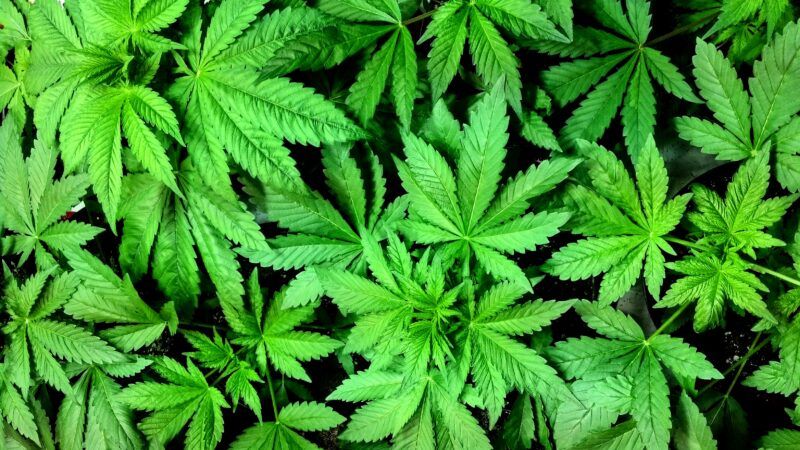50 Years After Nixon's Commission Said Cops Should Stop Busting Pot Users, the Federal Ban Remains Unchanged
But 37 states allow medical or recreational use, and arrests are falling.

Fifty years ago today, the National Commission on Marihuana and Drug Abuse issued a report that was quite different from what President Richard Nixon probably was expecting when he appointed the blue-ribbon panel, which was chaired by former Pennsylvania Gov. Raymond Shafer. From the perspective of a president who the year before had declared drug abuse "America's public enemy number one," the report's title—Marihuana: A Signal of Misunderstanding—was not promising. And it got worse from there.
"The criminal law is too harsh a tool to apply to personal possession [of marijuana] even in the effort to discourage use," the Shafer Commission concluded. "It implies an overwhelming indictment of the behavior which we believe is not appropriate. The actual and potential harm of use of the drug is not great enough to justify intrusion by the criminal law into private behavior, a step which our society takes only with the greatest reluctance."
Based on that assessment, the report recommended that "possession of marihuana for personal use no longer be an offense" and that "casual distribution of small amounts of marihuana for no remuneration, or insignificant remuneration, no longer be an offense." That policy, which became known as marijuana "decriminalization," went nowhere with the Nixon administration. But that decade, nearly a dozen states, beginning with Oregon in 1973, took the commission's advice, typically changing low-level possession from a criminal offense to a civil violation punishable by a modest fine. President Jimmy Carter endorsed decriminalization in 1977, when he told Congress that "penalties against possession of a drug should not be more damaging to an individual than the use of the drug itself."
The popularity of that sentiment peaked in the late 1970s, after which support for marijuana reform dipped in reaction to pot-smoking teenagers and a reinvigorated war on drugs during the Reagan and George H.W. Bush administrations. But today, the National Organization for the Reform of Marijuana Laws notes, "32 states and the District of Columbia have enacted legislation either legalizing or decriminalizing the possession of marijuana for adults." Marijuana is recognized as a medicine in 37 states, 18 of which, accounting for more than two-fifths of the U.S. population, also allow recreational use.
Congress, meanwhile, still has not followed the Shafer Commission's recommendation. At the federal level, marijuana remains illegal for all purposes, and even low-level possession is still a crime. Even relatively modest attempts to address the conflict between state and federal marijuana laws have failed to make any headway in the Senate, where Majority Leader Chuck Schumer (D–N.Y.) insists his own legislation should take priority.
President Joe Biden, a longtime drug warrior who now portrays himself as a reformer, says he supports federal decriminalization of marijuana use and thinks states should be free to legalize. But unlike nearly all the other candidates he beat for the Democratic presidential nomination, he opposes repealing the federal ban on marijuana.
Biden promised that he would "broadly use his clemency power" to commute the sentences of nonviolent drug offenders and specifically said that anyone who had been convicted of marijuana offenses "should be let out of jail." But so far he has not used his clemency power at all.
Biden also talked about facilitating medical research by reclassifying marijuana under the Controlled Substances Act, which can be done administratively, without new legislation. But he has not taken any steps in that direction either.
Since 1969, Gallup has been asking Americans whether "the use of marijuana should be legal." The share saying yes rose from 12 percent in 1969 to 28 percent in 1977, then fell to 23 percent by 1985 before beginning a gradual ascent in the mid-1990s. According to the latest poll, two-thirds of Americans think marijuana use should be legal. Biden apparently is unimpressed by that sea change in public opinion.
What about the arrests that the Shafer Commission deemed a disproportionate response to marijuana use? The year the report came out, police in the United States made about 292,000 marijuana arrests, up from about 226,000 the year before. That number had risen to about 446,000 by 1978. It went down and up during the next decade or so before beginning a steep ascent in the early 1990s, peaking at about 873,000 in 2007. In 2020, the total was about 350,000, down 36 percent from the year before and 60 percent lower than the 2007 peak.
The overwhelming majority of these cases (91 percent in 2020) involved low-level possession, which corresponds with the arrests that the Shafer Commission said should end half a century ago. In absolute terms, the 2020 total was still higher than the number in 1972. But adjusting for population growth, the marijuana arrest rate fell by about 24 percent, from 139 to 106 per 100,000 Americans.


Show Comments (15)